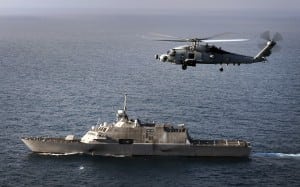
NATIONAL HARBOR, Md.—Due to the planned procurement of only one Littoral Combat Ship (LCS) in fiscal year 2018, the Navy aims to award a contract for the frigate program and downselect to a single vendor late that year, the service’s program manager said Wednesday.The Navy initially expected to begin procuring 20 frigates, split by shipbuilders Lockheed Martin [LMT] and Austal, in 2019. However, Defense Secretary Ashton Carter’s 2015 memo—which stipulates a total combined by of 40 LCS and frigates and…













